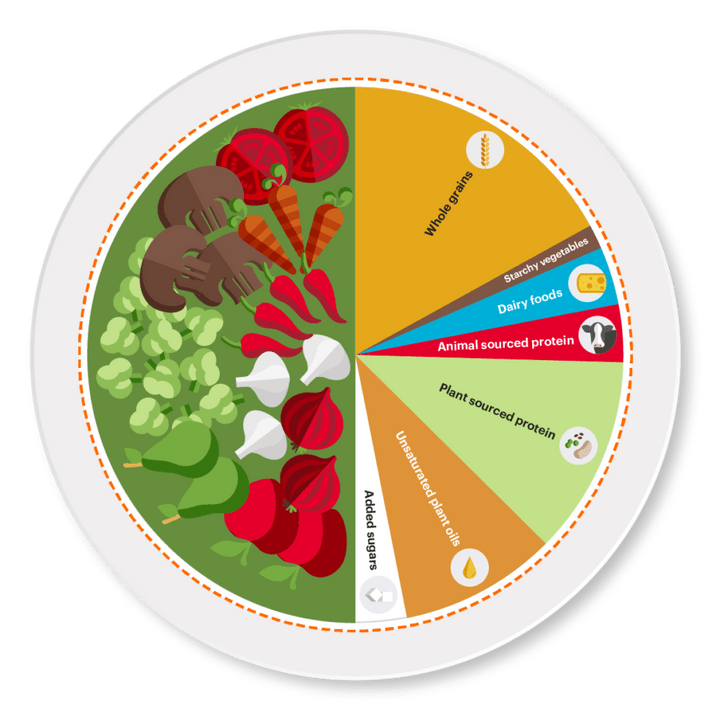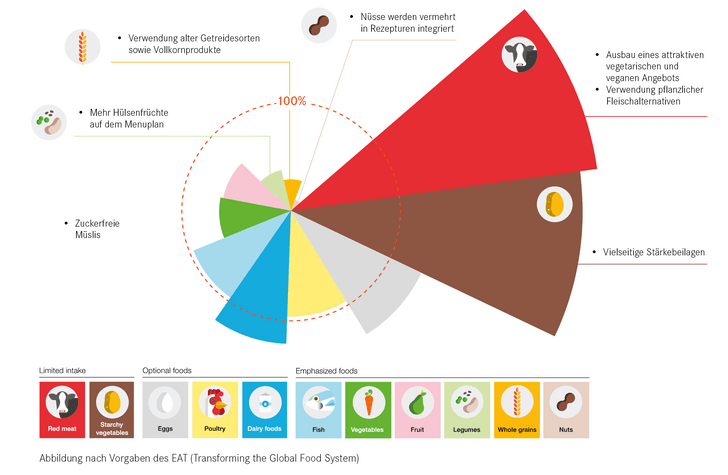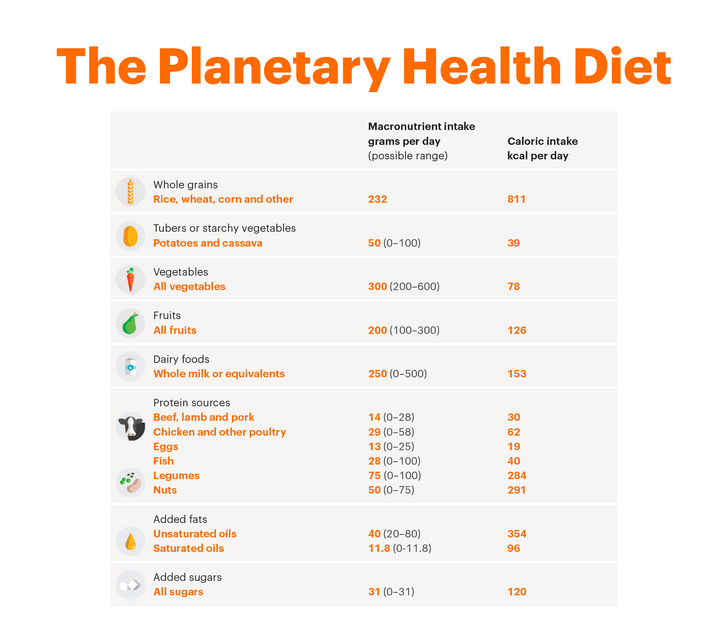“The Planetary Health Diet”: good for you. good for the planet
The Planetary Health Diet* is a scientific guideline for a diet that is healthy for both people and the planet. It is based on the recommendations of 40 international scientists who published the EAT-Lancet Report in 2019. This comprehensive view is also in line with the SV Group’s credo, which is why we have aligned our measures to promote sustainable nutrition with the Planetary Health Diet.
The Planetary Health Diet plate
The Planetary Health Diet focuses on a balanced and environmentally friendly diet. All foods – plant-based and animal-based – are permitted, but it’s important to have the right amounts. The available natural resources are used responsibly; food is not taken for granted and is not thrown away.

How are our diets and the health of our planet connected?
Many of the current global environmental problems are largely caused or at least exacerbated by the conventional production and consumption of food. For example, our conventional diet is responsible for 27% of global CO2eq emissions, as well as for loss of biodiversity on land and in water bodies, deforestation and the spread of animal diseases.
A detailed look shows where the biggest problem lies:
- About 80% of the world’s agricultural land is used for the production of meat and dairy products. These areas are used for animal husbandry, but above all for the cultivation of fodder.
- A similar picture emerges for CO2eq emissions: 82% of diet-related CO2eq emissions are caused by food production at the agricultural level. A large part of this is due to livestock farming (30%) and land use change for the production of animal feed (16%). Only a small proportion of CO2 emissions can be attributed to packaging (5%) or transport (6%).
Influencing factor: meat
To reduce the negative impact of agriculture on the environment, it is therefore important to consume meat and dairy products in moderation. Many other studies also show that a predominantly plant-based diet makes the biggest contribution to reducing the environmental impact of our food production.
Influencing factor: food waste
Reducing food waste is also crucial. Globally, around a third of the food produced for humans is thrown away. There are many reasons for this, such as strict quality standards that prevent vegetables from being processed or sold in the first place, errors in logistics, or overly large portions in restaurants. Most food waste occurs in private households. Ecological resources are used to produce every item of food, as well as human labor. So when we waste food, we waste not only the food itself, but also the labor and raw materials used in its production. In order to remain within the planetary boundaries, food waste must be halved worldwide by 2050.
Influencing factor: production
For an intact planet, all food must be produced sustainably, regardless of whether it is meat or vegetables. Fertilizers and pesticides, for example, must be used more carefully. Overfishing of the oceans must be stopped, and measures to reduce greenhouse gas emissions must be implemented.
Only when all these three changes come into effect can the negative impact of our diet on our environment be reduced.
Our measures for the Planetary Health Diet

How is our diet linked to our health?
The composition of our diet has an impact on both our ability to function and our health. Extreme discrepancies are apparent around the world: unfortunately, more than 800 million people are hungry today because they do not have access to enough food; on the other hand, about two billion people worldwide are overweight. In addition, it is estimated that around two billion people are malnourished because they do not consume enough nutrients through their diet. This can affect both undernourished and overnourished people if they follow an unbalanced diet; the latter and obesity can lead to cancer, cardiovascular disease and diabetes, among other things.
With our diet, we can make an important contribution to our health and our physical and mental well-being. A healthy diet consists of a high proportion of vegetables, fruit, whole grains, legumes and nuts. Meat and dairy products are part of the diet, but to a much lesser extent. The EAT-Lancet Commission proposes specific reference values that can ensure a healthy diet for everyone (Fig. 1). The aim of this reference menu is to create a framework that is as universal as possible for all people – but cultural, religious and geographical conditions must be taken into account, of course.
Links/references:
Reference menu of the EAT-Lancet Commission
The EAT-Lancet Commission has drawn up a strategy for agriculture and nutrition that aims to protect the health of humans and the planet in equal measure.

*In the context of the Planetary Health Diet, the English term “diet” is not the same as the German word “Diät”. It is, in fact, about the way people nourish themselves in the general sense.




